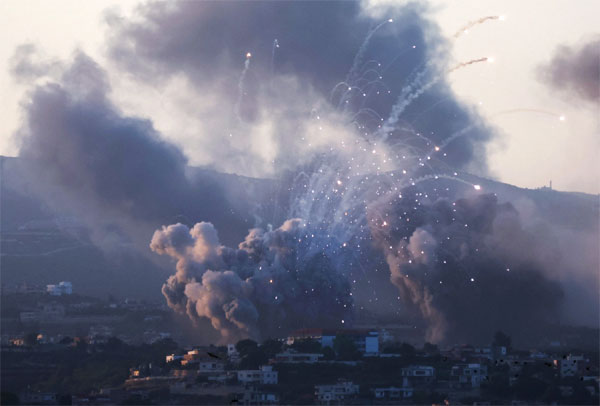Daijiworld Media Network - Beirut/Jerusalem
Beirut/Jerusalem, Oct 27: At least four people were killed and two others injured in a series of Israeli airstrikes across southern and eastern Lebanon on Sunday, marking one of the deadliest days since the latest escalation between Israel and Hezbollah.
According to Lebanon’s state-run National News Agency, Israeli drones and warplanes struck multiple vehicles in the towns of Zawtar, Qlaileh, Naqoura, and Nabi Sheet. Security officials told that three of the victims were Hezbollah fighters, while the fourth was a Syrian national.
In a statement, the Israeli military confirmed carrying out two rounds of strikes, claiming they killed a Hezbollah commander and a suspected weapons smuggler affiliated with the group. Israeli army spokesperson Avichay Adraee said one of the attacks in Qlaileh targeted and killed a member of Hezbollah’s elite Radwan Force.

Lebanese officials reported that at least 10 people have been killed in daily Israeli attacks over the past week. The Israeli military described the operations as part of an ongoing campaign to prevent Hezbollah from rebuilding its southern military infrastructure.
Despite a ceasefire agreement reached in November 2024, Israel has continued conducting near-daily airstrikes in southern Lebanon, saying they are necessary to neutralize “imminent threats” from Hezbollah positions along the border. Lebanese authorities and international organisations have condemned the strikes as clear violations of the truce.
Israeli media later reported that several senior Hezbollah commanders were killed in targeted operations over the past 24 hours, including:
• Zain al-Abidin Hussein Fatouni, commander of the Radwan Force’s anti-tank unit, killed in southern Lebanon;
• Mohammad Akram Arabia, a senior Radwan officer, killed in Qlaileh;
• Abd Mahmoud al-Sayyed, struck in Naqoura; and
• Ali Hussein al-Moussawi, identified by Israel as a weapons trafficker operating between Syria and Lebanon.
Meanwhile, Israeli defence minister Israel Katz toured the Israel-Lebanon border with US deputy special envoy for the Middle East Morgan Ortagus, underscoring close coordination between the allies amid the ongoing tensions.
Despite the ceasefire, Israel maintains eight military positions along the southern frontier. The UN Human Rights Office has recorded at least 103 civilian deaths since the truce began—many occurring near residential areas or UN peacekeeping sites—while Lebanon’s Health Ministry reports over 285 fatalities and more than 630 injuries during the same period.